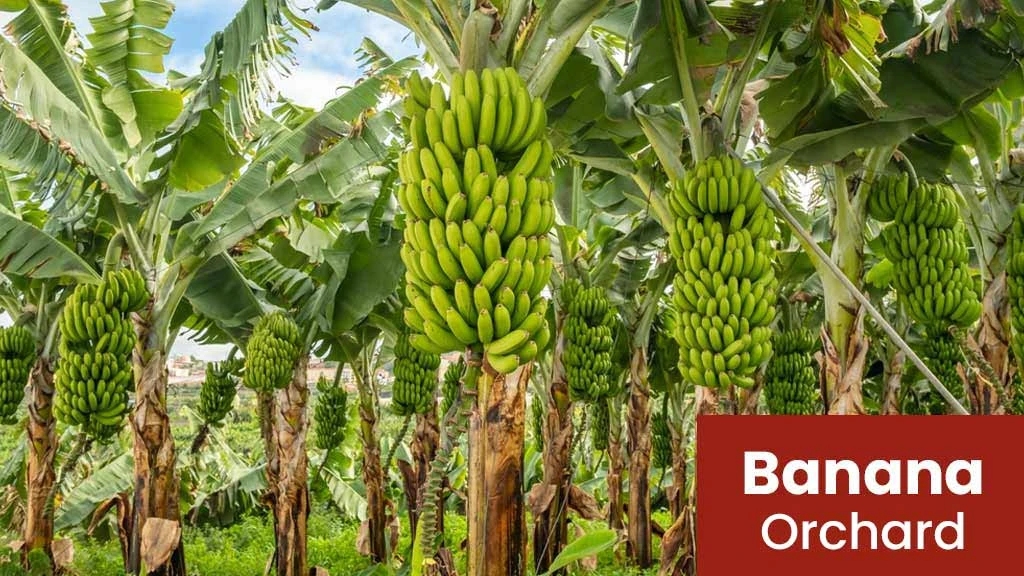Profitable Orchard Farming in India: Crop Selection & Best Practices

Orchard farming is widely practiced in India, which includes planting fruit-bearing trees and shrubs. The top orchard crops in India are banana, mango, orange, papaya, and guava. If you want to know about orchard farming and its complete details, then keep on reading this blog. Without any further delay, let's quickly jump into the blog.
Table of Contents
- Understanding Orchard Farming in India
- India’s Orchard Farming Scenario & Export Statistic
- What are the Top Orchard Crops in India?
- How do you Set Up an orchard farm in India?
- What are the Key Stages of Orchard Farming in India?
- Which are the Best Mini Tractors for Orchard Farming?
- What are the Government Initiatives to Promote Orchard Farming in India?
Understanding Orchard Farming
Orchard farming is an agricultural practice which includes cultivation and management of fruit or nut-bearing trees or shrubs which are planted in systematic layouts like grid or high-density arrangements. It is done for the purpose of commercial or local production. Unlike general crop farming, orchard farming focus on growing perennial woody plants which requires long term planning and maintenance for consistent production over years. Orchard farming has gained significant importance in India because of its economic sustainability and contribution to the farming sector.
India’s Orchard Farming Scenario & Export Statistic
India has witnessed remarkable growth in orchard farming over the past decade, with fruit production steadily increasing year after year. According to the National Horticulture Board, fruit production reached approximately 102.48 million tonnes in 2020–21. This surge has positioned India as the second-largest producer of fruits globally, accounting for 10.23% of the world’s total fruit production. In 2020–21, India exported fresh fruits and vegetables worth USD 1342 million (approximately INR 9941 crore), reflecting both the potential in scaling up its export capabilities.
What are the Top Orchard Crops in India?
The top orchard plants in India are Banana, Mango, Orange, Papaya, and Guava.
Banana

India is the largest producer of bananas worldwide. It is one of the crucial fruits widely cultivated in the country and considered a dessert fruit because of it is rich taste and easily digestible carbohydrates. The nutritional value of a banana is 67-137 calories per 100 grams. Banana has a share of around 31.72% of the total fruit production in the country. There are many different varieties of banana grown in the country, some of these include: Chengalikodan from Kerala’s Thrissur district, Nanjangud Rasabale from Mysuru district, Karnataka, Sirumalai Hill banana from Tamila Nadu (Kanyakumari) and Jalgaon banana from Maharashtra’s Jalgaon district, termed as the “banana capital of India”.
Each of these varieties is intrinsic to its region’s soil and climate, offering local farmers legal protection and recognition. Other major banana-producing states in India are Andhra Pradesh, Assam, and Bihar.
Mango

Mango is the king of fruits, and mango cultivation in India has been popular for over 400 years. It is produced in almost all the Indian states, and over 1000 varieties exist in India today. India is the largest mango producer in the world, with a market share of around 56% of the total mango production. Different Indian states in the country, grow different varieties of mango. Each rooted in its native region and celebrated for its distinct taste. For example, Alphonso/Hapus comes from the state of Maharashtra and grown in the particular region of Ratnagiri-Sindhudurg belt. Malihabadi Dashehari grows in the Malihabad region of Uttar Pradesh and Gir Kesar mango is grown in Gujrat’s Girnar foothill.
Orange

Orange is the most common citrus fruit grown in India, accounting for around 40% of the total citrus fruits cultivated in the country. India ranks 9th among the top orange-producing countries in the world, with a share of around 3%. The common citrus species of orange in India are mandarin (Citrus reticulata), acid lime (Citrus aurantifolia), and sweet orange (Citrus sinensis). Different varieties of Oranges grown in India include: The Nagpur orange (Vidarbha, Maharashtra), Wakro (Arunachal Pradesh), Coorg Mandarin (Kodagu, Karnataka) and Tamenlong (Tamenlong district, Manipur).
Papaya

Papaya is another fruit grown in orchards. Papaya trees require less area and are easy to cultivate. They start giving fruit in a year, offering more income per hectare alongside bananas. It is widely cultivated in the country because of its high nutrition and medicinal value. Papain, formed from dried latex of its immature fruits, can be used in the manufacturing of chewing gum, meat tenderizing, cosmetics, degumming natural silk, and giving shrink resistance to wool. The most common varieties of Papaya grown in India are Red Lady (a high-yield, hybrid), Coorg honey dew, Pusa Dwarf, and Kanchan. They are cultivated across regions like Maharashtra, Karnataka, Tamil Nadu, West Bengal and North East.
Guava

Guava is another crucial commercial fruit in India after mango, banana and citrus. It is an important source of calcium, vitamin C, pectin, and phosphorous. Guava is widely used in the preparation of processed products such as jellies, jams, and nectar. India is the world's largest guava producer, with an estimated production of 3,754.30 metric tons in 2021-22 (according to the National Horticulture Board). Allahabad Surkha (Prayagraj Surkha) is a popular variety of guava that is grown in the Kaushambi region of Uttar Pradesh. Other varieties include Allahabad Safeda, Lucknow 49 and Chittdar which are cultivated across the country in states of Uttar Pradesh, Maharashtra, Bihar, Tamil Nadu and West Bengal.
How do you Set Up an Orchard Farm in India?
Setting up an orchard farm in India is a long-term investment and requires proper planning. The different stages involved in setting up an orchard farm are discussed below:
Location and Site
Selecting a proper site is an important factor and involves different criteria. The site must be in a well-developed fruit-growing area, as you can benefit from the experience of other cultivators and sell the product through cooperative organizations with other fruit cultivators. The market must be close to the growing region, and climatic conditions should be ideal for the selected fruit crop.
The following factors must be accessed once you choose a site for setting up an orchard farm:
- The soil must be fertile and suitable for growth.
- The location should have a good drainage system, ensuring no water stagnation during the rainy season.
- Ensure that irrigation facilities should be available at all times of the year.
- Ensure that there is proper market demand for the fruits you are planning to grow in the orchard.
- The transportation facilities should be within reach of the site, whether by road or rail.
- Labour availability should be there.
Planning of an Orchard
You need to make a proper plan for efficient and economical management of the orchard. Keep in mind the following points while planning for the orchard:
- You need to keep the proper spacing between two plants and rows to plant a maximum number of trees per unit area.
- Irrigation channels should be laid in such a way that you have easy access to water in all orchards.
- The different fruit varieties should be planted in separate areas of the orchard.
- Stores and watchmen's sheds should be constructed in the centre of the orchard for proper supervision.
- In deciduous fruit trees, some varieties need pollen from other varieties to develop fruits in them, or else they can be left barren. Thus, pollinators should be planted in proper numbers to fulfil the need for pollination.
- For proper pollination, you need to plant flowering plants that attract pollinating agents like bees.
- You need to plant shorter trees in front and long trees in the back for easy supervision and improved appearance.
- Roads should be developed with minimum space for proper accessibility of the orchard farm. The space between the windbreaks and the first adjacent row is an ideal space for the road.
- You need proper fencing to keep the plants safe. Live fencing, such as agave, cactus, etc., could be a better choice as it is cheaper than the other types of fences.
- Windbreaks need to be planted in the orchard as they resist wind velocity, which protects the orchards from damage caused by strong wind. Windbreaks are rows of tall trees planted close together around the orchard.
Layouts in Orchard Farming
The layout is an important factor in orchard farming. It helps to plant the maximum number of trees per hectare, provides enough space for proper tree growth, and facilitates various intercultural operations in the orchard.
Broadly, four types of layouts are used in orchard farming: square system, triangular system, hexagonal system, and high-density planting system.
Square System
It is the most commonly used layout system in orchards. In this system, trees are planted in every corner of a square in straight rows, regardless of the planting distance. Thus, the centre area between the four trees can be used for the plantation of short-lived filler trees. This layout system can offer intercropping and cultivation in two directions.
Triangular System
This layout is based on the principle of the isolateral triangle. It is somewhat similar to the square system. However, the difference is that the trees planted in the odd rows are midway between the trees planted in the even rows instead of being just opposite to them. Each tree in this system takes up more area, and thus, it accommodates fewer trees per hectare than the square system.
Hexagonal System
This system involves the planting of trees in each corner of an equilateral triangle. Thus, six trees form a hexagon, with the seventh being in the centre. It offers equal spacing between the trees but is difficult to lay out. This system can accommodate 15% more trees than the square system. Thus, it is preferred in those regions where land is expensive.
High-Density Planting System
This system involves planting trees closer to the recommended spacing using special techniques. It is applied to achieve maximum productivity per unit area without sacrificing quality. It provides early cropping with higher yields and reduced labour costs.
What are the Key Stages of Orchard Farming in India?
The major stages involved in orchard farming are planting methods, irrigation & inter-cultural operations, and inter-cropping.
Planting Methods
Once the layout is finalized, you need to plant the trees exactly where the stakes stand. It can be done with the help of a planting board, which consists of a central notch and a hole on both sides. After that, you need to dig a pit of around a 1-metre cube or of the required dimension at the tree maker position.
In some cases, you need to allow the pits to dry up for a few weeks and then fill them with topsoil mixed with well-rotten Farmyard Manure and red earth. Then, irrigation is applied so that the contents of the pits settle down properly. If depressions happen because of irrigation, you need to add more soil to the pits and fill them to the land level. The pits become ready for planting.
The plantation should be done exactly where the original pegs were placed. You can do it by replacing the planting board with the help of guide pegs and bringing the stem to the central notch using a hand hoe.
Irrigation & Intercultural Operations
Two types of modern irrigation techniques are used in orchards: drip irrigation and sprinkler irrigation. You can use the ideal irrigation technique as per the type of orchard.
The intercultural operations in the orchard involve training, pruning, weeding, spraying, etc.
- Training is the process of directing the size, shape, and direction of plant growth, whereas pruning is the process of removing excessive tree branches to correct or maintain the tree's structure.
- Weed removal is an important step, as weeds can damage plant growth.
- Mulching can be done to protect the soil moisture and control the weed growth in orchards.
- Spraying is done to spray pesticides in the orchards to ensure the plants are free from insects and disease.
Inter-cropping
Intercropping includes planting companion crops in the spaces between fruit trees in the first few years or in the vacant areas of long-duration crops in the early periods. Growing intercrops can provide some returns on the vacant area, especially during early times when fruit plants do not produce any return.
Which are the Best Mini Tractors for Orchard Farming?
Mini tractors are gaining popularity in orchard farming because of their small size and ability to perform various inter-cultural operations, such as spraying, weeding, etc., within minimum space. Some of the best mini tractors that can be used for orchard farming are listed below:
- Swaraj 724
- Swaraj Target 625
- Swaraj Code
- Mahindra Jivo 245
- VST Shakti MT 270 Virat
- Kubota Neostar B2741S
What are the Government Initiatives to Promote Orchard Farming in India?
The government is taking various steps to promote and encourage orchard farming. One of the centrally sponsored schemes related to orchards is the Mission for Integrated Development of Horticulture (MIDH). The goal is to expand the area, covering new orchards and gardens for fruits, vegetables, and flowers. It also promotes the rejuvenation of old, unproductive orchards. From 2014 to 2023, 1.35 lakh hectares of old orchards were rejuvenated with the help of this scheme.
Under the scheme, the government offers a subsidy of 40% for general areas and 50% for the Northeast, Tribal Sub-Plan, Andaman & Nicobar, and Lakshadweep Islands to establish new orchards. This financial assistance is provided for a maximum of 4 hectares per beneficiary.
To rejuvenate old orchards, the government offers assistance of 50% of the total cost / INR 20,000 per hectare. This assistance is provided for a maximum of 2 hectares per beneficiary.
Frequently Asked Questions On Orchard Farming in India
1. What is the meaning of orchard farming?
Orchard farming is an agricultural practice that includes planting fruit-bearing trees and shrubs.
2. What are the orchard plants?
The orchard plants are banana, mango, orange, papaya, and guava.
3. What are the advantages of orchard farming?
Orchard farming helps maintain biodiversity, soil conservation and water management.
4. Which state is famous for its Orchards?
Maharashtra is famous for its orchards.
5. What is the difference between a plantation and an orchard?
The major difference between a plantation and an orchard lies in the crops grown. The plantation is a large-scale agricultural estate, whereas an orchard refers to the growing of trees and shrubs for fruit and nuts.


Related Blogs











